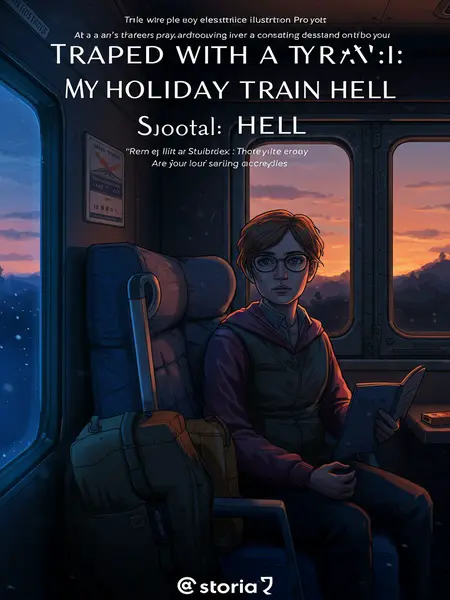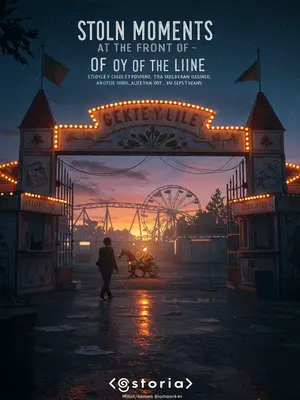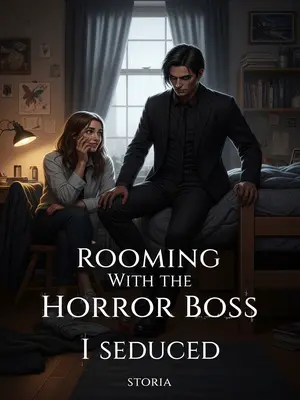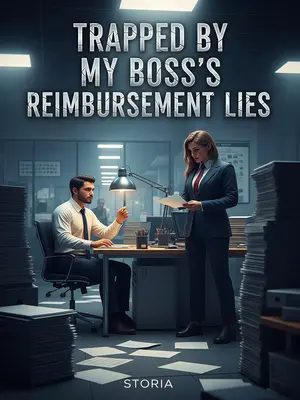Chapter 3: Lines Crossed
To make myself a bit more comfortable, I pulled up the curtain on the train, rested my elbow on the windowsill, and tried to give myself a little more space that way.
The curtain’s fabric was rough, the kind you find in every Amtrak car from Boston to Seattle. The light outside was blinding, but it was better than nothing. I shifted, trying to find a position where the pain in my back didn’t scream so loudly.
But things didn’t end there.
Just as I put my hand up, the man behind me suddenly got annoyed and yanked the curtain down hard.
The movement was sudden, almost violent—the curtain snapped down so fast I barely had time to react.
Anyone who’s taken Amtrak knows—the bottom of the curtain has a metal strip.
It’s a detail you don’t notice until it matters—the strip is cold, heavy, and can pack a punch if it hits just right. I’d always thought it was just for weight, not a weapon in a petty war.
The metal strip smacked my knuckles—hard. I yelped, more out of shock than pain, and shot the guy a glare. He didn’t even blink, just kept scrolling through his movie like I was invisible.
But the man just said coldly, "I told you I’m watching a movie. You still pull up the curtain on purpose? Are you looking for trouble? With the sunlight coming in, I can’t see the screen."
He sounded almost bored, like my discomfort was just background noise. His words stung more than the metal strip—like I’d somehow violated the sacred ground of his movie time.
At this point, I finally lost it.
Something inside me snapped. I was done playing polite, done trying to be the bigger person while he trampled over every line of decency. My voice was louder than I intended.
I turned around and snapped, "You won’t let me recline, you won’t let me pull the curtain—do you think this train is your house?"
My words echoed off the windows, sharper than I meant. I caught my reflection in the glass—red-faced, eyes blazing, jaw clenched tight. This was not the holiday homecoming I’d imagined.
He sneered, "The train isn’t my house, but it’s not yours either. Keep running your mouth and you’re gonna get decked."
He leaned forward, his voice low and threatening. The bravado in his words barely hid the childishness of the threat, but in that moment, the tension felt real. I could almost hear the air in the car change—passengers shifting, suddenly alert.
I squeezed my fists so tight my nails bit into my palms. Every instinct screamed at me to stand up for myself, but I kept my seat, replaying the HR warning in my head like a broken record.
A college kid in a hoodie glanced up, then quickly ducked back behind his laptop. An older woman clutched her purse tighter. No one wanted to be the one to step in.
I was so angry I actually laughed.
It was the kind of laugh that comes when you’ve run out of patience—raw, disbelieving, edged with exhaustion. I couldn’t believe this was real, that grown adults could act like this over a reclined seat.
He’d beat me up?
If he only knew. I sized him up, thinking of the years in the Army, the drills, the bruises, the hard lessons learned. I could take him, easy. But that wasn’t the point.
It was more likely I’d beat him up.
But what would that solve? All I could picture was the headlines: “Veteran Arrested in Amtrak Brawl.” That’s not the legacy I wanted for myself—or my buddies waiting back home.
I’m a retired vet—my back pain is an old injury from my service.
The thought stung. Every ache in my body was a souvenir from those years—a reminder of what I’d given for a country where sometimes, even common decency feels in short supply.
But the problem is, I absolutely can’t get into a fight.
My hands curled into fists, but I kept them on my lap. Years of discipline, of biting my tongue and choosing restraint over pride, all for moments like this.
After retiring, I took a civilian job, and my company cares a lot about my record. If I got into a fight, I could even lose my job.
HR had made it clear: zero tolerance for violence, even off the clock. I pictured the awkward meeting, the forced apologies, the box of my belongings if things went sideways.
In this situation, I was really at a disadvantage.
Every choice felt bad: fight and risk everything, or back down and let this guy win. For a moment, I just wanted to melt into the seat and disappear.
I never imagined that just taking a train home, I’d run into someone like this.
I’d expected a nap, maybe a bad sandwich, not a showdown worthy of a reality TV episode. Sometimes America feels like a thousand small battlegrounds—parking lots, public transit, checkout lines—each with its own unwritten rules and tiny wars.













